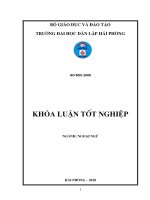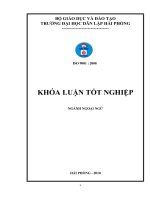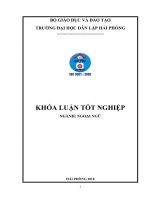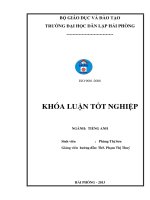A study on techniques to learn English idioms and proverbs
Bạn đang xem bản rút gọn của tài liệu. Xem và tải ngay bản đầy đủ của tài liệu tại đây (1.15 MB, 105 trang )
1
Bộ GIáO DụC Và ĐàO TạO
TRƯờNG ĐạI HọC DÂN LậP HảI PHòNG
ISO 9001 : 2008
KHóA LUậN TốT NGHIệP
NGàNH: ngoại ngữ
HảI PHòNG - 2010
2
HAIPHONG PRIVATE UNIVESITY
FOREIGN LANGUAGE DEPARTMENT
GRADUATION PAPER
the study on techniques to learn english
idioms and proverbs
By:
VU HOANG THAO
Class:
NA 1003
Supervisor:
DANG THI VAN, M.A.
HAI PHONG – 2010
3
Bộ GIáO DụC Và ĐàO TạO
TRƯờNG ĐạI HọC DÂN LậP HảI PHòNG
Nhiệm vụ đề tài tốt nghiệp
Sinh viên: Mã số:
Lớp: Ngành:
Tên đề tài:
4
Nhiệm vụ đề tài
1. Nội dung và các yêu cầu cần giải quyết trong nhiệm vụ đề tài tốt nghiệp
(về lý luận, thực tiễn, các số liệu cần tính toán và các bản vẽ).
2. Các số liệu cần thiết để thiết kế, tính toán.
3. Địa điểm thực tập tốt nghiệp.
5
CáN Bộ HƯớNG DẫN Đề TàI
Ng-ời h-ớng dẫn thứ nhất:
Họ và tên:
Học hàm, học vị:
Cơ quan công tác:
Nội dung h-ớng dẫn:
Ng-ời h-ớng dẫn thứ hai:
Họ và tên:
Học hàm, học vị:
Cơ quan công tác:
Nội dung h-ớng dẫn:
Đề tài tốt nghiệp đ-ợc giao ngày 12 tháng 04 năm 2010
Yêu cầu phải hoàn thành xong tr-ớc ngày 10 tháng 07 năm 2010
Đã nhận nhiệm vụ ĐTTN Đã giao nhiệm vụ ĐTTN
Sinh viên Ng-ời h-ớng dẫn
Hải Phòng, ngày tháng năm 2010
HIệU TRƯởNG
GS.TS.NGT Trn Hu Ngh
6
PHầN NHậN XéT TóM TắT CủA CáN Bộ HƯớNG DẫN
1. Tinh thần thái độ của sinh viên trong quá trình làm đề tài tốt nghiệp:
2. Đánh giá chất l-ợng của khóa luận (so với nội dung yêu cầu đã đề ra
trong nhiệm vụ Đ.T. T.N trên các mặt lý luận, thực tiễn, tính toán số
liệu):
3. Cho điểm của cán bộ h-ớng dẫn (ghi bằng cả số và chữ):
Hải Phòng, ngày tháng năm 2010
Cán bộ h-ớng dẫn
(họ tên và chữ ký)
7
NHậN XéT ĐáNH GIá
CủA NGƯờI CHấM PHảN BIệN Đề TàI TốT NGHIệP
1. Đánh giá chất l-ợng đề tài tốt nghiệp về các mặt thu thập và phân tích tài
liệu, số liệu ban đầu, giá trị lí luận và thực tiễn của đề tài.
2. Cho điểm của ng-ời chấm phản biện :
(Điểm ghi bằng số và chữ)
Ngày tháng năm 2010
Ng-ời chấm phản biện
8
ACKNOWLEDGEMENTS
I am extremely grateful to all of the people for helping me to finish my
graduation paper.
First of all, I wish to express my sincere thanks and deepest gratitude to
my supervisor – Ms. Dang Thi Van for her whole-hearted guidance and
valuable suggestion during the process of doing this research.
Additionally, I am also grateful to all of the teachers of Foreign
Language Department of Haiphong Private University for their enthusiastic
assistance during the time I studied at the university.
I wish to forward my special thanks to my parents and my friends for
whatever they support and encourage me both mentally and physically in this
time.
I am fully aware that shortcomings and mistakes are inevitable in my
research. Any comments and suggestions would be highly appreciated for the
perfect of my own research.
Haiphong, June, 2010
Vu Hoang Thao
9
TABLE OF CONTENTS
ACKNOWLEDGEMENTS
PART ONE: INTRODUCTION 1
1. Rationale 1
2. Aims of the study 2
3. Methods of the study 2
4. Scope of the study 3
5. Design of the study 3
PART TWO: DEVELOPMENT 4
CHAPTER I: THEORETICAL BACKGROUND 4
1. An overview on idioms and proverbs 4
1.1. What is idiom? 4
1.2. What is proverb? 7
2. The characteristics of English idioms and proverbs 9
2.1. The characteristics of English idioms 9
2.2. The characteristics of English proverbs 12
3. The influence of British culture on their idioms and proverbs 13
3.1. The influence caused by geographical conditions 13
3.2. The influence caused by weather 14
3.3. The influence caused by history 15
3.4. The influence caused by religious beliefs 16
3.5. The influence caused by literature 17
3.6. The influence caused by social fashions 18
3.7. The influence caused by food and drinks customs 19
3.8. The influence caused by pets 20
CHAPTER II: THE STUDY ON TECHNIQUES TO LEARN ENGLISH
IDIOMS AND PROVERBS 22
1. Studying English idioms and proverbs basing on thematic categories 22
2. Practising on English - Vietnamese idiomatic expression translation 37
10
3. Studying English idioms and proverbs through their origins 39
4. Studying English idioms and proverbs through pictures, songs, games,
etc. 45
CHAPTER III: IMPLICATION OF THE STUDY 70
1. Some problems when learning English idioms and proverbs of
Vietnamese people 70
2. Suggested solutions to learn English idioms and proverbs well 73
PART THREE: CONCLUSION 79
REFERENCES 80
APPENDIX 82
11
PART I: INTRODUCTION
1. Rationale
Nowadays, English is considered the global language and used in every field
of our life. English is the first criteria concerned when we want to apply for a
good job. The development of the whole society requires us not only to know
English but also to reach a high level satisfying the high requirements of the
job we want to apply for. Therefore, the need of studying this language today
is higher and higher.
Apart from improving four skills including Listening, Speaking, Reading and
Writing, it will be a big shortcoming when studying a foreign language
without taking notice of the treasure of idioms and proverbs of the country
where it was born. Studying and applying creatively English idioms and
proverbs help students reach the flexibility in using this language and the
creativity of simple but vivid sentences in daily speech. Moreover, this
treasure can bring us the approach of other cultures. That is the quintessence
of the linguistic treasure, the efficient tool for human‟s thought and affection
exchange.
The diversity of English idioms and proverbs may make students confused at
first. Thus, it is really important to have effective studying methods and I
decided to choose a study on techniques to learn English idioms and proverbs
as my final report.
12
2. Aims of the study
English idioms and proverbs are a fantastic treasure to discover for the
benefits it brings. And my study aims at the following concrete targets:
Enriching the English idioms and proverbs for students to learn this
language.
Assisting students to express thoughts and affection accurately,
polishedly, concisely and vividly.
Helping students to approach to British culture, customs and traditions
and have a deeper look at our own culture, country and people as well.
Giving some suggested advices and specific exercises.
3. Methods of the study
In order to finish my graduation paper, I try with my best effort to search the
necessary documents in reference books or from websites on the Internet. I
selected valuable information relating to my study after carefully reading
those references.
I also applied my knowledge and experiences achieved during the process of
studying at Haiphong Private University.
Especially, I received lots of useful advices from my supervisor and my
friends as well.
13
4. Scope of the study
Idioms and proverbs can be seen in every situation when we learn English.
They make our daily speech become more natural, vivid and attractive.
Except from developing the necessary skills, idioms and proverbs can bring
us a better feel for this language and British culture as well.
5. Design of the study
This paper consists of three parts:
PART I: INTRODUCTION - shows the rationale, aims, methods, scope and
design of the study.
PART II: DEVELOPMENT (the main part of the study) is divided into three
chapters:
Chapter I: Theoretical background – provides an overview on English idioms
and proverbs, their features and the influence of British culture on their
idioms and proverbs.
Chapter II: The study on techniques to learn English idioms and proverbs
Chapter III: Implication - Some problems when learning English idioms and
proverbs of Vietnamese people and suggested solutions to learn well
PART III: CONCLUSION – The references and specific exercises.
14
PART II: DEVELOPMENT
CHAPTER I: THEORETICAL BACKGROUND
1. An overview on idioms and proverbs
1.1. What is idiom?
What is an idiom?
Dubrovin (1995) defines "idiom" to be a set of phraseological units which
meaning does not result from the meaning of its components.
The definition by Dean Curry (1994) is “the assigning of a new meaning to a
group of words which already have their own meaning”.
Moon (1998) says that idioms are typically institutionalized, lexico-
grammatically fixed and non-compositional expressions.
Collins (2000) defines idioms as a group of words, which have a different
meaning when used together from the one it would have if the meaning of
each word were taken individually and that are usually employed in everyday
language to precisely express ideas and concepts that can not be compressed
into a single word.
(
According to Irujo (1986), “An idiom is a conventionalized expression whose
meaning cannot be determined from the meaning of its parts” and “Idioms
15
differ from other figurative expressions, such as similes and metaphors, in
that they have conventionalized meanings”.
(
An idiom is an expression, word, or phrase that has a figurative meaning that
is comprehended in regard to a common use of that expression that is separate
from the literal meaning or definition of the words of which it is made.
(
An idiom is a combination of words that has a meaning that is different from
the meanings of the individual words themselves. It can have a literal
meaning in one situation and a different idiomatic meaning in another
situation.
(
For examples:
a. “let the cat out of the bag” means “to reveal a secret, to let somebody know
a secret”.
E.g: We'd planned a surprise party for Donna, but some guy she works with
let the cat out of the bag, so now she knows.
Don't forget that this is a secret, so whatever you do, don't let the cat out of
the bag!
16
b. “feel like a million dollars” means “to feel wonderful, to feel well and
healthy, both physically and mentally”.
E.g. A quick swim in the morning makes me feel like a million dollars.
c. “beat about the bush” means “to avoid coming to the point, to approach a
subject in a round-about manner, instead of coming directly to it”.
E.g. Stop beating about the bush and answer my question!
d. “break the ice” means “to say or do something friendly in order to
overcome shyness or to ease tension in a social situation”.
E.g. The hardest part about a first date is breaking the ice.
To break the ice, let's invite our new neighbors to lunch.
e. “to give up” means “to stop doing something”.
E.g. If you give up smoking, your health will surely improve a lot.
Finally, they gave up the search because they were exhausted.
f. “to hold one's horses” means “to stop and wait patiently for someone or
something”.
It comes from a time when people rode horses and would have to hold their
horses while waiting for someone or something.
17
E.g. "Hold your horses," I said when my friend started to leave the store.
The above explanations and examples are extracted from
and
1.2. What is proverb?
What is an proverb?
Miguel De Cervantes defines that “A proverb is a short sentence based on
long experience”.
(
Lord Russell defined a proverb as “the wisdom of many, the wit of one”.
(
A proverb is
a simple and concrete saying popularly known and repeated, which
expresses a truth, based on common sense or the practical experience of
humanity.
(
a condensed but memorable saying embodying some important fact of
experience that is taken as true by many people.
(
18
a brief traditional oral expression that generally remains in fixed.
(
A proverb is a short saying or sentence that is generally known by many
people. The saying usually contains words of wisdom, truth or morals that are
based on common sense or practical experience. It is often a description of a
basic rule of conduct that all people generally follow or should follow.
Proverbs can be found in all languages.
(
For examples:
a. “Money doesn't grow on trees” means “Money is not easy to get and you
must work hard for it”.
E.g. The girl's father often says that money doesn't grow on trees when she
asks him for money.
b. “The early bird catches the worm” means “Arriving early gives one an
advantage”.
E.g. My boss always comes to work early because he believes that the early
bird catches the worm.
c. “The pen is mightier than the sword” means “Writing and ideas are more
powerful than the use of force”.
E.g. The pen is mightier than the sword and a good idea or strong beliefs will
defeat the strongest army.
19
d. “Rome wasn‟t built in a day” means “Important things do not happen
overnight”.
E.g. Don’t get impatient! Remember that “Rome wasn’s built in a day”.
e. “Love is blind” means “One sees no faults in the person one loves”.
E.g.
- You know, Lisa always ignores all of her husband’s shortcomings.
- No doubt about it! Love is blind.
(
2. The characteristics of English idioms and proverbs
2.1. The characteristics of English idioms
Generally idioms have the following characteristics:
a. Non-compositionality:
Katamba (1993) says that “The meaning of an idiom is not a straightforward
composition of the meaning of its parts”.
And according to Langacker (1986), “Idioms are widely defined as being non-
compositional or even compositional after the meaning is known”.
Although the word that make up the idiom have their own literal meanings, in
the idiom they have lost their individual identity. We can not predict the
meaning of an diom from the sum of its parts:
E.g: Kick up one’s heels (means “to celebrate”).
Bite the bullet (means “to endure in a difficult situation”).
Hit the hay (means “to go to bed”).
20
b. Non-substitutability:
1. Constituents can not be replaced:
Constituents of idioms can not be changed or replaced. For example, “kick the
bucket” (means “to die”) can not be changed as “kick the pail” or “strike the
bucket”.
2. Word order can not be changed:
The word order can not be inverted or changed. For instance, “by twos and
threes”, “at sixes and sevens” and “tit for tat” can not be turned into “by
threes and twos”, “at sevens and sixes” and “tat for tit”.
3. Constituents can not be deleted or added to:
The constituents of an idiom cannot be deleted or added to, not even an
article. Take the idiom “out of the question” for example, it means
“impossible”. If the article “the” is deleted, the idiomaticity will be lost and it
will signify “no question” instead.
c. Non-modifiability:
We can not modify an idiom or apply syntactic transformations. Some idioms
are fixed, and do not present internal variation, while there is also a large
proportion of idioms that allow for different degrees of internal variability,
and with a variable number of elements.
Syntactically frozen idioms can not be syntactically transformed into the
passive and still retain their figurative meaning.
21
E.g.
John bought the farm # The farm was bought by John.
John bit the dust # The dust was bitten by John.
d. Institutionalization:
According to Grant and Bauer (2004), institutionalization refers to the degree
of recognition a particular phrase meets in a speech community. There are
idioms that have cultural roots and are understood only by those communities
that share the same cultural values.
For example, people from different cultures can easily understand idioms
such as “cold as ice”, “firm as a rock” due to their similar observation to the
world.
On the other hand, owing to different living environment, social customs,
religion and other factors, some images can not raise resonance.
For instance, in Western countries, the navigation industry is fast developed
and they have many idioms which are related to sea life and people from
countries of continental civilization may not easily understand them.
E.g. a big fish: an important and influential person
a fresh fish: a new prisoner
a poor fish: a foolish person
(
22
2.2. The characteristics of English proverbs
Lord Russell defines a proverb as “the wisdom of many, the wit of one”. This
points out three of the major features of a proverb:
1. They have an arresting and individually inspired form (the wit of one).
2. They have a wide appeal and endorsement (of many).
3. Their content comments itself to the hearer as true (wisdom).
Three additional common features of proverbs are:
1. They are usually short.
2. They are easy to remember.
3. They are most frequently transmitted orally.
Sometimes uniqueness of form is missing, but the content has sufficient
appeal to win a wide audience:
“You can lead a horse to water, but you can't make him drink”.
Though the proverb has little in its form to insure survival, its wide
applicability insures its remembrance.
On the other hand, form may preserve a proverb whose content is not
otherwise capable of sustaining it: “He who laughs last laughs best”.
The statement would not long be remembered if it were not for its assonance
and alliteration.
23
Finally, there are proverbs that have both universal applicability and a
compelling form: “Look before you leap”. The idiom warns of the importance
of caution, and displays alliteration.
(
3. The influence of British culture on their idioms and proverbs
Culture and language is closely related and actually can‟t be separated.
Language is influenced and shaped by culture. Every aspect of culture, either
material or spiritual, directly influences language. Owing to this kind of close
relationship, language is described as the carrier of culture and the mirror of
cultural characteristics. Therefore, idioms and proverbs which are considered
as the essence of language, are deeply influenced by culture. Different nations
possess different cultures. As a result, idioms and proverbs of different
nations must be affected by their own peculiar cultures. English idioms and
proverbs are no exception to the rule. British geographical conditions, life
experiences, histories, religious beliefs and literatures are all stamped on their
idioms and proverbs.
3.1. The influence caused by geographical conditions
Britain is an island country, with Atlantic Ocean to the west and north, the
English Channel to the south and the North Sea to the east. Therefore, British
culture can be regarded as sea culture. And British people also have a special
passion for water. The British people live along the cost line and their
livelihood is dependent on the coast, so they get a close relationship with sea
and have many idioms and proverbs related to sea and water.
24
E.g.
“spend money like water”: to spend too much money in a careless way.
“to keep one‟s head above water”: to manage to survive a difficult experience.
“all at sea”: in a state of confusion and disorder.
“a drop in the ocean”: a quantity too small to make any improvement.
“to rest on one‟s oars”: to take an interval of rest after hard work.
The long and bendy coastline promotes British sailing and fishing, so idioms
and proverbs of this kind are in large quantities.
E.g.
“plain sailing”: a course of action that is free from difficulties.
“when one‟s ship comes home/in”: when one has become successful.
“a big fish”: an important and influential person.
“a fresh fish”: a new prisoner.
“a poor fish”: a foolish person.
“like a fish out of water”: to feel awkward because you are not familiar with a
situation or because you are very different from the people around you.
“Don‟t drown the man who taught you to swim”: Don‟t hurt someone who
takes care of you.
3.2. The influence caused by weather
The climate of Britain is the typical temperate oceanic climate, rainy and
foggy. The annual rainfall of the whole Britain is about 1016mm. Moreover,
it is foggy on the island, especially in winter. We can see that English idioms
and proverbs clearly reflect their weather and climate conditions.
E.g.
“rain cats and dogs”: rain very heavily.
25
“fog-bound”: trapped by fog.
“It never rains it pours”: misfortunes usually come in large numbers.
“Every cloud has a silver lining”: it is always possible to get something
positive out of a situation, no matter how unpleasant, difficult or even painful
it might seem.
3.3. The influence caused by history
History, as part of social culture, is an influential factor not only for a nation
but also for a language. It plays an indispensable role in the development of a
country. It also promotes the evolution of a language and affects its idioms
and proverbs.
E.g.
“to cross the Rubicon”: to take a decisive and irrevocable step.
The allusion is to Julius Caesar's act when with his army in 49 B.C. he
unconstitutionally crossed the River Rubicon, which separated his province
from Italy, and so brought on the Civil War.
“Do in Rome as the Romans do”: One should change one's habits to suit the
customs of the place one is living.
The allusion is to the Roman Conquest of England.
“to sleep on brushwood and taste gall”: to undergo self-imposed hardships so
as to strengthen one's resolution to wipe out a national humiliation.
The allusion is to the act of Yueh Emperor GouJian in the Warring Period,
when his country was conquered; however, he did not lose heart but wanted to
rebuild his empire.









